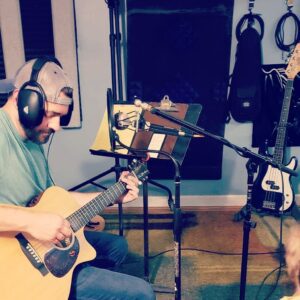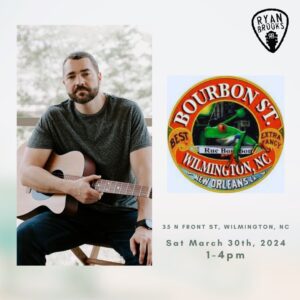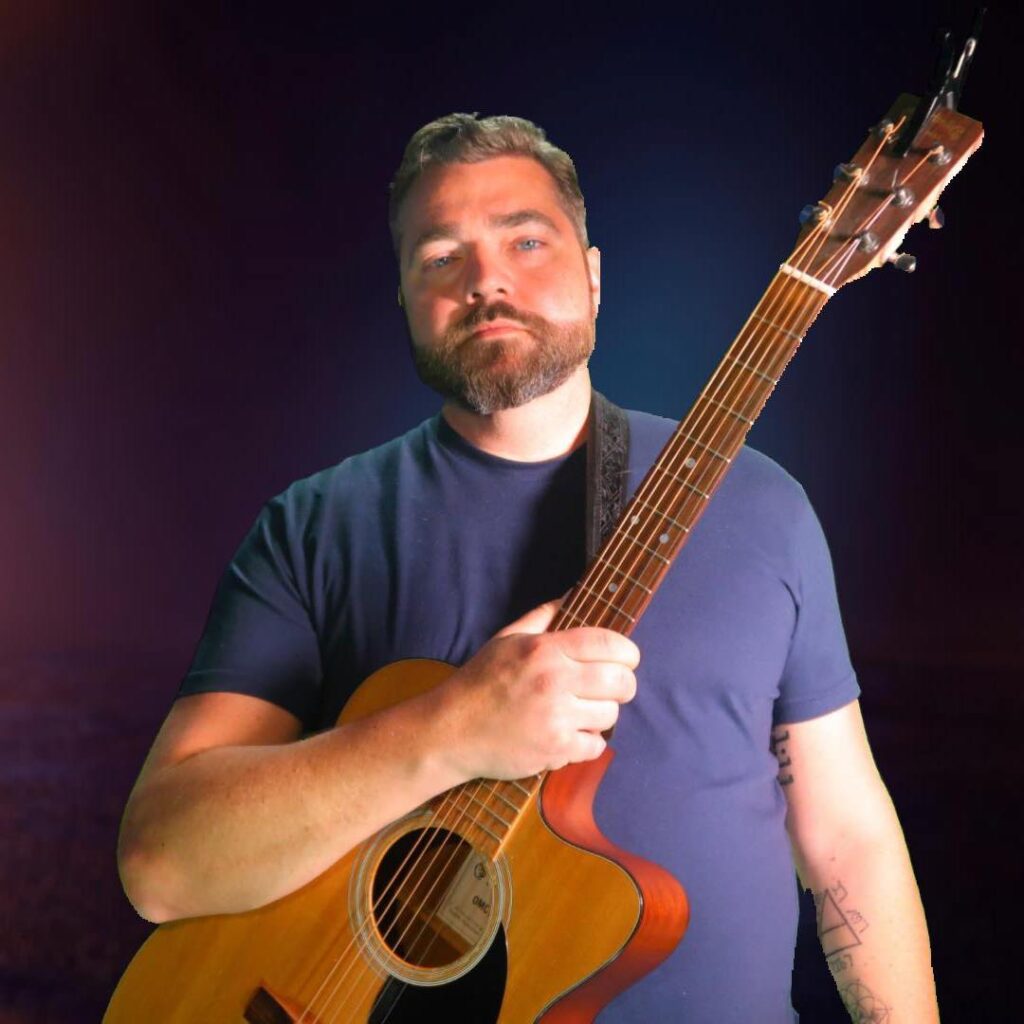“When I bump into other musicians around town, they keep asking ‘where the hell have you been?’ I really don’t have an answer for them. I just tell them I’ve been taking time for myself.”
Ryan Brooks’ life has bounced back and forth from Charlotte to Wilmington for years. His mother lives here. His father lives there. Ryan knows both communities well. He grew up in Mint Hill, a small town in Mecklenburg County. He went to college at UNC-W, graduating in 2003. Afterwards, he got a job working for a software company based in the Charlotte area. In the 20 years since, for long weekends, beach getaways, or just to visit family and friends, Ryan has frequently been traveling back to the Port City.

He now calls it home. Ryan moved to Wilmington in 2022. He came this way because his remote job gave him the freedom to do so, and besides, he was also looking for a fresh start following a divorce. Something else was motivating his choice of a new hometown – he wanted a place where he could play his music.
“When I moved here, I started going to all the open mics around town, just to get myself acclimated to the scene and meet other musicians. I think that kind of gave me a good footing to develop some relationships and get my name out.”
Before he made the move, Ryan had been doing shows and performing in the Charlotte area for about 12 years or so. He describes his style as being all over the map. He plays a mix of pop, reggae, country, rock, and grunge. As a child of the 90s, he’s a big Pearl Jam and Nirvana fan. He’s also mastered beachy/coastal music, and every show he’ll pepper in a cover of Prince or maybe The Commodores. Additionally, he’s written numerous original songs which can be found on most digital outlets like Spotify and Apple music.
But recently Ryan hasn’t been playing anything – at least not publicly. Shortly after moving to Wilmington, after performing a few shows at the Bourbon Street Cafe downtown and Panacea Brewing Company on Oleander, Ryan simply stopped.
“Everybody who knows me on a personal level, close family and friends, knows I’ve been a musician for many, many years and that it’s very unlike me to step away from something that I am so passionate about… but that’s what depression will do to you. It robs you of those passions you have.”
It come with the territory?
“I actually wasn’t diagnosed with bipolar disorder until 2019. Looking back as a child, growing up I remember getting into these funks that I told myself were just growing pains. But inside I always thought maybe there’s something wrong with me… which apparently it turns out there was. I guess it kind of goes with the territory.”
Most of us have the wrong perception of bipolar disorder. We tend to think of moods that swing on a daily, hourly, or even moment-to-moment basis, which could not be further from the truth. Rarely is the turnover so immediate. To understand Ryan’s story, you have to get the concept of seasons – long, drawn-out periods of time that can last for several weeks or even months on end.
When he’s up, what he calls his severe mania stage, Ryan can do some things that are less than well thought out. He once disappeared to Florida on a long vacation without telling anyone. He blew a ton of money down in Key West just hanging out at bars, playing wherever would have him, enjoying the social scene and being the life of the party.
On the flip side, when the mania is over, a severe and crippling depression sets in. It’s a gloom and bleakness that hangs over everything. During those seasons, Ryan tends to be a recluse – separating himself from the rest of the world.
“Whenever you’re manic, you are severely high. You are elated all the time. You have this excitement inside of you. You want to keep doing things. It’s actually an amazing creative outlet. I wrote about 20 songs when I was in my last manic phase. It was crazy, the creativity and the juices were just flowing. I put out two EPs that I recorded here in Wilmington… and then I lost all that momentum when the depression hit. I suddenly lost interest in music. I didn’t eat a lot. I was just constantly tired. I would sit and watch TV or sleep all day. You have this grim view of the world, and things are just not copacetic. You don’t feel like you are ever going to come out of it – that’s the worst part, I think – is that fact that it just never feels like there’s a light at the end of the tunnel.”
For certain, mental health is a concern for everyone. Statistics and studies tell us that no one group is more prone to developing issues than others. Women are just as likely as men, blacks just as likely as whites, an atheist just as likely as a believer. Having said that, doesn’t it feel, at least on an anecdotal level, that depression, deep sadness, and melancholy strike the artists and creatives a little deeper?
Perhaps it comes with the territory. Perhaps it is the way they are wired.
If you dedicate yourself to getting others to feel something – to feel the emotions tucked away in a song or a sentence – you have to experience those feelings first. It’s the only way to pass it on. An artist’s calling demands them to be empathetic. And so, the highs become higher and lows become a little bit lower.
For Ryan, the depressive state took away his confidence. He stopped functioning. For nearly three months, he needed his father to serve as a caretaker. He’ll tell you that the only thing that rescued him from the pits was proper medication. He is on several antidepressants now, which have helped with his mood but more importantly, they’re allowing him to get excited about life and music again. He goes to therapy once a month, and to a psychiatrist every six months. He is learning, at 43 years old, how to navigate his depressive states and how to maintain so he, hopefully, doesn’t go manic again.
“Honestly, I’ve just been crawling out of a hole. Little by little, I’ve just been digging myself out of this hole that I found myself in two years ago. And it’s taken me this long to finally get back to a point where I feel more confident, I feel like I can write again. I feel like I can perform again. It’s a blessing to be able to do that and it’s something I don’t take for granted anymore.”
BACK ON STAGE
“I just want to do gigs out of the sheer joy of playing music. That’s something that was taken away from me for a long time. It’s something I want to do because I love to do it… to share a part of myself with anyone who is willing to listen.”

So far, 2024 has been spring training of sorts for Ryan. Every week he’s been going out to the open mics again. He recently played the Monday night open mic at Mad Katz. On Tuesdays, he goes to Katy’s Grill. On Wednesday, just to feel more comfortable being in front of people again, he may sing karaoke. All of it is preparation for what’s coming at the end of the month.
On Saturday March 30th, from 1 pm to 4 pm, at the Bourbon Street Café, Ryan Brooks will take the stage for the first time in two years, performing his own show. This time it will be different. There was a time he dreamed of making it big and going on tour. There was another time when he booked gigs simply to make a little bit of cash on the side. He knows now that those were the wrong reasons. And so, when he takes the stage at the end of the month, he’ll be playing really for an audience of one – himself.
“I feel like I still have things to say, that I still have things to write about – especially considering the past couple of years, all the ups and downs. But also, I want to do it for myself, to prove to myself that you can still do this. This is still part of you. This is still part of your identity. You’re still a musician and bipolar disorder can’t rob you of that. It may take away a lot of things, but it can’t take away the fact that you are still a musician, that you still have a talent that you’re supposed to share.”
